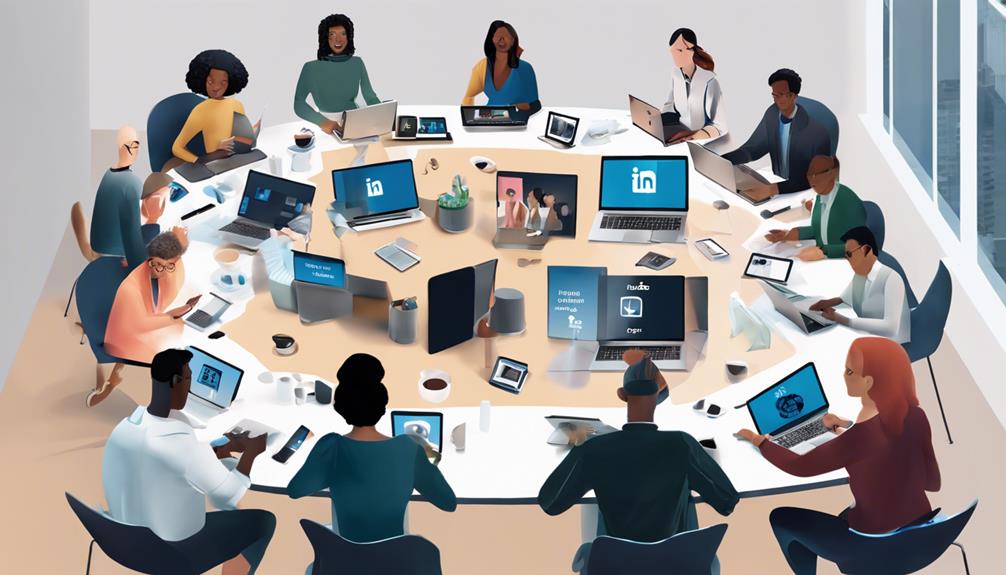
As you navigate the crowded landscape of LinkedIn, you've likely noticed that the top posts for skill development offer a wealth of knowledge that can transform the way you approach your career. From emerging tech skills to indispensable soft skills, these insights are tailored to keep you ahead in the fast-evolving job market. But have you wondered how to leverage this information effectively to maximize your professional growth? Consider how these strategies could reshape your skill set and open new doors in your career path, and imagine what more you could achieve by applying these nuggets of wisdom in your daily professional endeavors.
Analyzing Industry Leaders' Strategies

Many industry leaders consistently leverage LinkedIn to boost their visibility and influence. As you delve into their strategies, you'll notice it's not just about sharing content but engaging thoughtfully with their network.
You can see them comment on posts, sparking meaningful conversations that often lead to broader discussions outside LinkedIn. They also frequently share articles and insights that aren't just promotional but provide real value to their followers.
This approach helps them build credibility and establish themselves as thought leaders within their industry. By analyzing these patterns, you can start to see which topics resonate most within your field and how you might craft your messages for maximum impact.
Moreover, these leaders often utilize LinkedIn's rich array of tools, such as publishing articles directly on the platform, which enhances their visibility.
They make sure their profiles aren't only complete but optimized with keywords relevant to their expertise, making them more discoverable to others in the industry.
Emerging Tech Skills to Master
In today's rapidly evolving tech landscape, it's crucial to stay ahead by mastering emerging skills. You've got to dive into areas like artificial intelligence (AI), machine learning (ML), and data science, which aren't just buzzwords but essential tools shaping our future.
If you're looking to boost your career, understanding and applying these technologies can set you apart. Start by exploring Python and R for data analysis, crucial for roles in data science and AI. Python, in particular, is versatile and widely used in various tech developments, making it a staple in your skillset.
Additionally, familiarize yourself with AI frameworks like TensorFlow or PyTorch, which are pivotal in building and deploying AI models.
Blockchain technology is another area you can't afford to overlook. With its implications stretching beyond cryptocurrency into sectors like healthcare, finance, and supply chain management, knowledge of blockchain can open up numerous opportunities.
Lastly, cloud computing skills, including platforms like AWS, Azure, and Google Cloud, are indispensable. Businesses are moving towards cloud solutions, and being proficient in these services will ensure you're in demand.
Essential Soft Skills for Success

You'll also need to hone your soft skills to truly excel in today's job market. Beyond the technical know-how, your ability to navigate social interactions, adapt to changes, and communicate effectively are what'll set you apart.
Firstly, communication is key. You're not just sharing information; you're also actively listening and adapting your message to ensure clarity and understanding. Whether it's persuading a team, presenting an idea, or writing a compelling email, how you convey messages matters immensely.
Teamwork is another critical area. Even if you prefer to fly solo, the ability to collaborate smoothly with others can propel projects forward and foster an innovative environment. It's about finding common ground and valuing diverse perspectives.
Don't overlook the power of emotional intelligence. Understanding your own emotions, as well as those of your colleagues, can lead to healthier workplace relationships and more effective leadership. It's about making everyone feel valued and understood.
Lastly, problem-solving isn't just for technical issues. Daily challenges in interpersonal and organizational settings require innovative, empathetic approaches to find solutions that satisfy all parties involved.
These skills aren't just nice to have; they're essential. So, start developing them today to stand out tomorrow.
Trends in Online Education Platforms
Online education platforms are rapidly evolving, offering you increasingly personalized learning experiences. These platforms are harnessing the power of AI to curate course recommendations based on your learning habits and career goals. This means courses that match your pace and preferences are pushed to your dashboard, making learning not just accessible but also tailored just for you.
You've probably noticed more interactive elements popping up in your courses. From gamified learning modules to real-time quizzes, these features keep you engaged and test your knowledge as you go. It's not just about watching videos anymore; it's about interacting and applying what you learn in virtual scenarios.
Moreover, community features are becoming a staple. You're no longer learning in isolation. Instead, you can connect with peers, join study groups, or participate in discussion forums. These communities offer support and a sense of belonging, which can significantly enhance your learning experience.
Accessibility is also a key focus. Courses are now more likely to include subtitles, varied language options, and mobile-friendly formats, ensuring that you can learn anytime, anywhere.
This shift is democratizing education, making learning opportunities available to a broader audience worldwide.
Maximizing LinkedIn Learning Features

Building on the momentum of evolving online education platforms, LinkedIn Learning offers a robust suite of features that can significantly enhance your professional development.
You've got access to personalized course recommendations tailored just for you, based on your job role, skills, and industry. This means you're always in the loop with the most relevant content to boost your career.
You can also set weekly goal trackers that nudge you to allocate time for learning, breaking down your bigger educational goals into manageable chunks. It's a great way to stay committed without feeling overwhelmed.
Plus, the interactive quizzes and exercises at the end of each course help you assess your understanding and retention of material, ensuring you're not just watching videos but actively learning.
Don't forget to leverage the option to download courses for offline learning. Whether you're commuting or in a place with spotty internet, you can keep learning on the go.
Finally, make use of the Q&A sections where instructors and other learners engage. It's an excellent resource for getting additional perspectives and solutions to practical problems you might encounter.
Make the most of these features and watch your professional skills soar.
Networking Tips From Top Professionals
From top industry leaders, the most effective networking tips often emphasize the importance of building genuine connections. You've likely heard it before, but how you engage with others truly matters. Start by showing genuine interest in their projects and challenges. It's not just about exchanging business cards; it's about exchanging ideas and values.
Don't forget, consistency is key. You need to keep in touch, not just reach out when you need something. A quick message commenting on a recent achievement or sharing an article that you think might be of interest can keep the bond strong. Remember, it's about cultivating a relationship, not just adding names to your contact list.
Leveraging social platforms like LinkedIn effectively can catapult your networking efforts. Engage with content posted by your connections. Comment thoughtfully, which shows you're not only active but thoughtful. This visibility helps keep you in the minds of your peers and might lead to more direct interactions.
Lastly, always be open to giving back. If you come across an opportunity that isn't right for you but could benefit someone else, pass it on. Networking is a two-way street; your willingness to help others will often come back to benefit you.
Project Management Best Practices

In the world of project management, effectively juggling multiple tasks and deadlines is crucial to your success. To excel, you'll need to hone specific practices that can significantly enhance your project outcomes.
First off, always define clear objectives and milestones. Without them, you're navigating without a map. You must know your final destination and the key stops along the way. It's not just about having goals, but making sure they're SMART: specific, measurable, achievable, relevant, and time-bound.
Communication is your next big ticket. You've got to keep everyone on the same page. This means regular updates and transparent feedback channels. It's about ensuring that the flow of information keeps pace with project needs. Don't assume people know; always confirm.
Risk management can't be overlooked. Anticipate potential issues and have contingency plans ready. This proactive approach saves you from firefighting when something goes awry.
Lastly, leverage technology. Use project management tools that provide real-time collaboration and tracking. These tools don't just keep projects on schedule; they provide valuable insights on performance metrics.
Stick to these practices, and you'll see your projects not just survive but thrive.
Building Effective Personal Branding
To establish a strong personal brand, you must first understand its impact on your career growth. Personal branding isn't just about crafting a catchy slogan or having a sharp logo; it's about consistently presenting yourself in a way that aligns with your professional goals and values.
You're not just selling skills; you're communicating the unique combination of experiences and personal insights that you bring to the table.
Start by identifying what sets you apart. What're your core strengths? How do your peers describe you? This self-awareness is critical, as it forms the foundation of your brand.
Next, you need to communicate this brand effectively. Be active on platforms where your target audience spends their time. Share content that resonates with your professional persona but remains authentic to who you are.
Creative Problem-Solving Techniques

Building your personal brand sets the stage for showcasing skills like creative problem-solving, a highly sought-after asset in any professional field. You can't afford to overlook this vital ability, as it distinguishes you in a competitive job market.
But how do you enhance and demonstrate this skill?
First, start by embracing diverse perspectives. Don't just stick to what you know; actively seek out different viewpoints and integrate them into your approach. This will open up a plethora of solutions you mightn't have considered otherwise.
Next, practice the art of questioning. Instead of accepting things at face value, ask why they're done a certain way. This habit not only uncovers inefficiencies but also triggers innovative solutions.
Furthermore, leverage the power of brainstorming sessions. They're not just for group projects; you can brainstorm alone by jotting down all possible solutions to a problem, then refining them one by one.
Lastly, don't shy away from experimenting. Every innovative solution was once a bold experiment. Test your ideas in small, manageable stages to see what works and what doesn't, adjusting as necessary.
Frequently Asked Questions
How Frequently Should I Update My Linkedin Profile?
You should update your LinkedIn profile whenever you gain new skills, complete significant projects, or change roles. Aim for a review every six months to keep your information fresh and relevant to your network.
What's the Ideal Length for a Linkedin Post?
For an effective LinkedIn post, you should aim for 100-200 words. This length keeps it concise yet detailed enough to engage and inform your network, without overwhelming them with too much information.
Can Linkedin Endorsements Boost My Job Prospects?
Yes, LinkedIn endorsements can boost your job prospects by showcasing your skills and credibility. They signal to employers that you're recognized by your peers, enhancing your professional reputation and potentially opening new career opportunities.
Should I Accept All Linkedin Connection Requests?
You shouldn't accept all LinkedIn connection requests. Be selective to maintain a professional network that truly reflects your career interests and goals. Quality over quantity enhances your profile's relevance and professional integrity.
How to Handle Negative Feedback on Linkedin?
When you receive negative feedback on LinkedIn, it's crucial to stay professional. Acknowledge the comment, reflect on any valid points, and respond constructively. This shows your commitment to improvement and professionalism.
Conclusion
You've explored the landscape of skill development—from mastering cutting-edge tech skills like AI to enhancing essential soft skills such as emotional intelligence. Now's the time to apply these insights. Leverage online platforms, maximize LinkedIn Learning, and build a robust personal brand. Network effectively and refine your project management tactics. By integrating these strategies, you'll not only stay ahead in your field but also enhance your professional growth. Dive in, the tools for your career advancement are at your fingertips.






